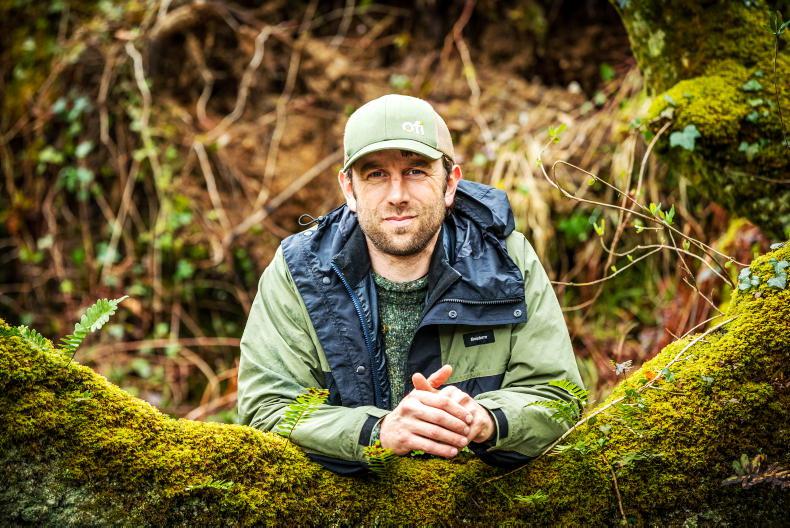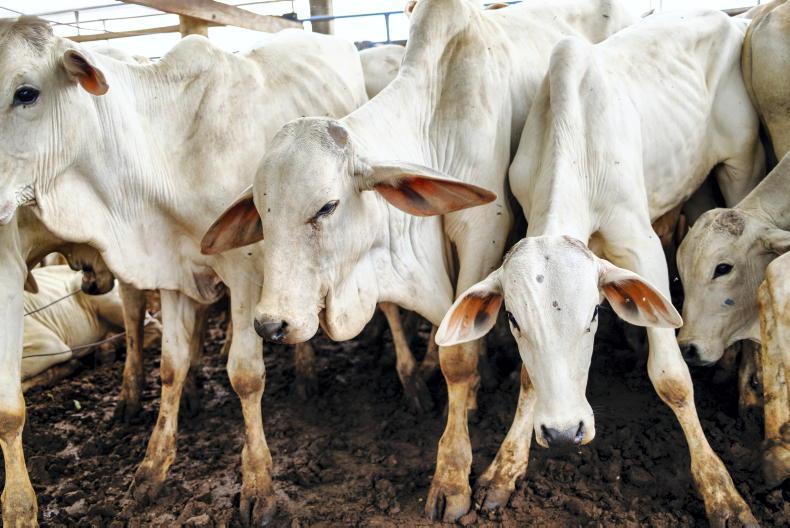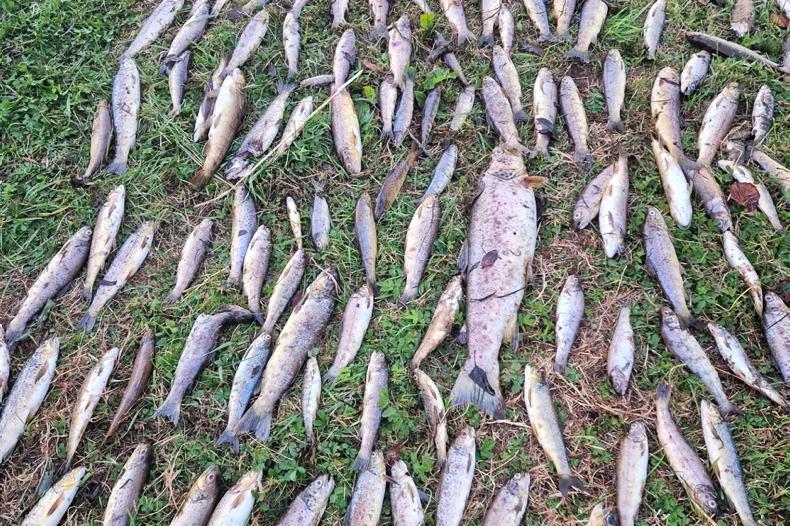The San Luis Dam in the San Joaquin Valley of California stands like a totem; a warning to farmers everywhere of the catastrophic consequences of losing the support of the public, and in the support of elected politicians.
The dam was built in 1963 with the sole objective of providing water to the farmers within the valley. As the California water wars intensified, environmental and urban municipality lobbies made their cases for larger and larger water allocations. In 2021, the dam’s allocation for agriculture hit a critical milestone – zero.
Farmers got zero.
In many ways, the erosion of farmers’ political efficacy in California (and the rest of the developed world) should surprise no one.
It wasn’t too long ago we were all either directly or indirectly involved in food production. But those days are gone. Despite the fact Irish farmers are producing more food than ever, the farming constituency has shrunk, and with it the understanding of the difficulties faced by those who work the land for a living.
The public needs to be educated, not blackguarded
In recent weeks, we heard news of a new project (code name ‘Connect’) being set up to educate the public on “all things farming”. The body is reported to be backed by Bord Bia, the meat processors, the dairy co-ops and Teagasc, as well as some of the larger farmer representative organisations.
The premise of the body is that Irish farming would be better placed if it could get its story out there. In reality, those representing the sector have never had a problem telling the story they want to tell.
Millions are spent on campaigns and initiatives through Agri Aware, the National Dairy Council, Ornua or Bord Bia to burnish the reputation of the sector.
Farm organisations such as the IFA and ICMSA also expend significant capital on putting forward a particular view of Irish farming. We’ve all seen the adverts; rolling green fields, happy families and cows content at grass. Even the State research agency is willing to “pull on the green jersey” when required.
The Irish press, for its part, is usually happy to give stories from the farm an easy ride.
The issue now is that the gulf between the stories we are being told and the reality on the ground is becoming impossible to ignore. Dumping of slurry, spreading slurry in the wet weather, clearing of habitats, and declining wildlife and water quality are sadly common features of life in rural Ireland.
While often dismissed as environmentalist hysteria, the reality is these issues are widespread and often systemic. Only last week I spoke to an environmentally conscious farmer who was spreading slurry on his land with a rain gun because he had no other choice after what has been a wet autumn, winter and spring.
The impacts of bad practice are detailed in numerous reports from State agencies and academic institutions.
This is having a damaging effect on the perception of farmers in general, the vast majority of whom are doing their level best to operate within the rules.
The ostensible rationale behind the proposed body is, the public “don’t get it”. This is part of the problem.
Certainly, there is a disconnect between farming and the public. The average man or woman on the street doesn’t know or care about the implications of a late spring, or a dip in the milk price.
They also don’t understand what it takes to produce food.
Barely a week goes by without someone taking to social media to describe a recently trimmed hedgerow as “ecocide”.
While other sectors can control their message through clear channels, farming has no such luxury
Nonetheless they do understand the big picture – nature is suffering and agriculture is a major driver. No amount of spin or bluster will change that.
A difficult task
Undoubtedly, farming has a unique challenge when it comes to communicating.
While other sectors can control their message through clear channels, farming has no such luxury.
It is represented by numerous competing farm representative organisations, alongside tens of thousands of individual farmers on social media.
The issues they communicate on are wide-ranging and complex, often transcending simple economics.
The whole thing is a PR person’s nightmare. The resulting incoherence was on full show during the recent tractor protests. There was clearly deep frustration on the part of participants but, aside from some vagaries about European solidarity, I couldn’t pick one clear message from the event.
Internal confusion
As well as being a threat to public support, the muddled and even obfuscatory nature of farm messaging presents a real danger to farmers themselves, particularly when they can’t distinguish the messaging from reality.
The lead-up to the nitrogen derogation reduction provided a good example. Despite it being quite clear that it was to be reduced, it was repeatedly presented by farm leaders and farm media as an inconceivable outcome. When it finally happened, farmers appeared incredulous rather than prepared. Had leadership really not known? Were they caught up in some kind of “don’t talk down the derogation” game of bluff? Either way, it was ordinary farmers who lost out.
In this confusing media space, many farmers are now falling into conspiratorial thinking, pushing loaded messaging such as “no farmers, no food” or constantly attacking bogeyman figures such as Eamon Ryan.
The dangerous consequences of this trend are revealing themselves across the continent as we speak. Just this week it was alleged that nine Spanish farmers who met on an internet forum decided to set fire to a company that trades products from Morocco. There were 25 employees inside.
Too important to not get right
Farming is the most unique and important occupation there is. Producing food is hard, unpredictable and increasingly unprofitable.
Protecting the role of those who are willing to do it now and into the future is a critical task.
The Irish public tends to have a favourable view of farmers
Thankfully, Ireland is well-placed to get this right. As latecomers to the “developed world”, we have retained good connections back to the land.
The Irish public tends to have a favourable view of farmers.
For everyone’s sake, this connection should be cultivated and strengthened. If it breaks down, as it has elsewhere, farmers will be left politically isolated and vulnerable.
So, by all means yes, let’s have a new body, but let’s not confuse marketing or lobbying with actual education. It’s too important an issue to not get right.

Ray Ó Foghlú.
Ray Ó Foghlú works for eco-system restoration charity, Hometree.
Food needs to be produced sustainably.Agriculture needs to tell its own story accurately to the public to ensure people know how food is produced.In telling that story, it needs to show there are many things to improve on.The sector needs to call out bad practice like spreading slurry in bad weather conditions.The gulf between farming marketing messages and reality on the ground is becoming impossible to ignore. 
The San Luis Dam in the San Joaquin Valley of California stands like a totem; a warning to farmers everywhere of the catastrophic consequences of losing the support of the public, and in the support of elected politicians.
The dam was built in 1963 with the sole objective of providing water to the farmers within the valley. As the California water wars intensified, environmental and urban municipality lobbies made their cases for larger and larger water allocations. In 2021, the dam’s allocation for agriculture hit a critical milestone – zero.
Farmers got zero.
In many ways, the erosion of farmers’ political efficacy in California (and the rest of the developed world) should surprise no one.
It wasn’t too long ago we were all either directly or indirectly involved in food production. But those days are gone. Despite the fact Irish farmers are producing more food than ever, the farming constituency has shrunk, and with it the understanding of the difficulties faced by those who work the land for a living.
The public needs to be educated, not blackguarded
In recent weeks, we heard news of a new project (code name ‘Connect’) being set up to educate the public on “all things farming”. The body is reported to be backed by Bord Bia, the meat processors, the dairy co-ops and Teagasc, as well as some of the larger farmer representative organisations.
The premise of the body is that Irish farming would be better placed if it could get its story out there. In reality, those representing the sector have never had a problem telling the story they want to tell.
Millions are spent on campaigns and initiatives through Agri Aware, the National Dairy Council, Ornua or Bord Bia to burnish the reputation of the sector.
Farm organisations such as the IFA and ICMSA also expend significant capital on putting forward a particular view of Irish farming. We’ve all seen the adverts; rolling green fields, happy families and cows content at grass. Even the State research agency is willing to “pull on the green jersey” when required.
The Irish press, for its part, is usually happy to give stories from the farm an easy ride.
The issue now is that the gulf between the stories we are being told and the reality on the ground is becoming impossible to ignore. Dumping of slurry, spreading slurry in the wet weather, clearing of habitats, and declining wildlife and water quality are sadly common features of life in rural Ireland.
While often dismissed as environmentalist hysteria, the reality is these issues are widespread and often systemic. Only last week I spoke to an environmentally conscious farmer who was spreading slurry on his land with a rain gun because he had no other choice after what has been a wet autumn, winter and spring.
The impacts of bad practice are detailed in numerous reports from State agencies and academic institutions.
This is having a damaging effect on the perception of farmers in general, the vast majority of whom are doing their level best to operate within the rules.
The ostensible rationale behind the proposed body is, the public “don’t get it”. This is part of the problem.
Certainly, there is a disconnect between farming and the public. The average man or woman on the street doesn’t know or care about the implications of a late spring, or a dip in the milk price.
They also don’t understand what it takes to produce food.
Barely a week goes by without someone taking to social media to describe a recently trimmed hedgerow as “ecocide”.
While other sectors can control their message through clear channels, farming has no such luxury
Nonetheless they do understand the big picture – nature is suffering and agriculture is a major driver. No amount of spin or bluster will change that.
A difficult task
Undoubtedly, farming has a unique challenge when it comes to communicating.
While other sectors can control their message through clear channels, farming has no such luxury.
It is represented by numerous competing farm representative organisations, alongside tens of thousands of individual farmers on social media.
The issues they communicate on are wide-ranging and complex, often transcending simple economics.
The whole thing is a PR person’s nightmare. The resulting incoherence was on full show during the recent tractor protests. There was clearly deep frustration on the part of participants but, aside from some vagaries about European solidarity, I couldn’t pick one clear message from the event.
Internal confusion
As well as being a threat to public support, the muddled and even obfuscatory nature of farm messaging presents a real danger to farmers themselves, particularly when they can’t distinguish the messaging from reality.
The lead-up to the nitrogen derogation reduction provided a good example. Despite it being quite clear that it was to be reduced, it was repeatedly presented by farm leaders and farm media as an inconceivable outcome. When it finally happened, farmers appeared incredulous rather than prepared. Had leadership really not known? Were they caught up in some kind of “don’t talk down the derogation” game of bluff? Either way, it was ordinary farmers who lost out.
In this confusing media space, many farmers are now falling into conspiratorial thinking, pushing loaded messaging such as “no farmers, no food” or constantly attacking bogeyman figures such as Eamon Ryan.
The dangerous consequences of this trend are revealing themselves across the continent as we speak. Just this week it was alleged that nine Spanish farmers who met on an internet forum decided to set fire to a company that trades products from Morocco. There were 25 employees inside.
Too important to not get right
Farming is the most unique and important occupation there is. Producing food is hard, unpredictable and increasingly unprofitable.
Protecting the role of those who are willing to do it now and into the future is a critical task.
The Irish public tends to have a favourable view of farmers
Thankfully, Ireland is well-placed to get this right. As latecomers to the “developed world”, we have retained good connections back to the land.
The Irish public tends to have a favourable view of farmers.
For everyone’s sake, this connection should be cultivated and strengthened. If it breaks down, as it has elsewhere, farmers will be left politically isolated and vulnerable.
So, by all means yes, let’s have a new body, but let’s not confuse marketing or lobbying with actual education. It’s too important an issue to not get right.

Ray Ó Foghlú.
Ray Ó Foghlú works for eco-system restoration charity, Hometree.
Food needs to be produced sustainably.Agriculture needs to tell its own story accurately to the public to ensure people know how food is produced.In telling that story, it needs to show there are many things to improve on.The sector needs to call out bad practice like spreading slurry in bad weather conditions.The gulf between farming marketing messages and reality on the ground is becoming impossible to ignore. 











SHARING OPTIONS